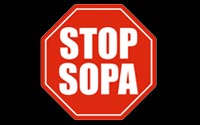 Ask.com, Citysearch, and Urbanspoon will join the likes of Google, Mozilla, Reddit and Wikipedia in a widespread protest to raise awareness of two
anti-piracy bills pending in Congress known as the Stop Online Piracy Act (SOPA) and its Senate counterpart, the PROTECT IP (PIPA) Act.
Ask.com, Citysearch, and Urbanspoon will join the likes of Google, Mozilla, Reddit and Wikipedia in a widespread protest to raise awareness of two
anti-piracy bills pending in Congress known as the Stop Online Piracy Act (SOPA) and its Senate counterpart, the PROTECT IP (PIPA) Act.
SOPA (H.R.3261) is an anti-piracy bill working its way
through Congress, along with its companion PIPA. The SOPA bill would create a system for taking down content and Web sites that the Department of Justice (DOJ) deems are dedicated to copyright
infringement.
The bill gives the DOJ and/or copyright owners the authority to seek a court order to bar search engines, hosts or domain registrars from linking to Web sites that are supporting
or hosting pirated content or facilitating copyright infringement in any way. The order could demand that search engines, social networks and domain-name services block access to sites that
violate the law. It also would make unauthorized Web streaming of copyrighted material a felony, with a possible penalty of up to five years in prison.
advertisement
advertisement
Similar to Google's show of opposition
on its home page, Ask.com will donate ad space on the home page to voice opposition to the act to more than 60 million Ask.com users who visit the site daily. An ad will link to the Open Congress Web site, giving visitors a place to directly take action against the bill.
Citysearch will block access to multiple
parts of the site: Things to Do Nearby; first review under each business; and add a marketing message on the top of the Web site. I also will link to anti-SOPA messaging.
Urbanspoon will black out access to portions of the site's user-generated content, including photos and reviews. When users hover over the black areas, they will have an option to click on
anti-SOPA messaging to learn more, and then access the blocked content.
No one disputes the fact that piracy is evil. But Jimmy Wales, co-founder at Wikipedia, said that bill would describe
his site as a search engine -- which, under the bill, would prohibit linking to sites like Pirate Bay, which allows people to share copyrighted content it doesn't own, even in the
description.